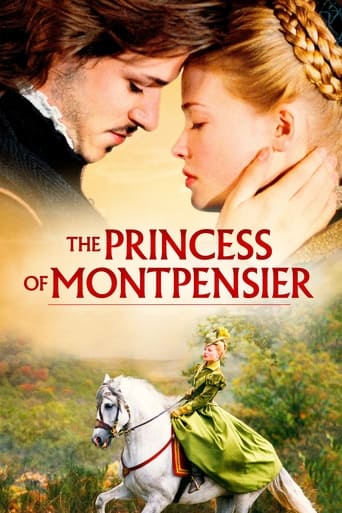Viator Veritatis
This is a vapid costume drama set out in the French renaissance. It features some decent cinematography, beautiful photography and gorgeous costumes. Mélanie Thierry looks incredible, almost edible in her robes of velvet satin, and the movie makers don't miss a chance to reveal her luscious forms.However, the film bursts like a bubble gum anytime you take the pain to look a bit deeper. The war scenes are totally unhistorical, with armies fighting without any battle line, like drunkards in a tavern brawl, and the top commanders hacking and slashing on the front line instead of organizing the battle from behind.Most of all, there is little character development and the main character is portrayed in a superficial, contradictory way. On one side she appears as an intelligent, considerate young woman; on the other she betrays a loving and faithful husband and dishonors her name and her family's for a fickle teenager love, after stating several times she won't ever do it. She behaves more like a 14-years-old in love with some pop star. If that's emancipation, we can surely live without it.In another unlikely scene, the husband's life-long friend, who owes him his life and fortune, betrays his trust and allows the lover in the princess' rooms, with no apparent reason and against his own expressed judgment.Watch this movie if you like flashing swords, wondrous velvets and vapid, shallow love stories with not much of a plot. Yet if you are a thinking person chances are that you won't get much out of this paltry flick.
chaos-rampant
Doing a historical film about medieval Europe is anathema. Because the only reason to set your romance in that era is to invoke some grand historicity that imbues love and suffering with larger agency, you are constrained by how simple and unimaginative is this historical narrative as handed down to us. Breath of life has been largely sucked out of it and you're left with melodramatic gestures and events, stereotyped contrasts of atmospheric squalor versus opulence, or the simple and senseless wars and counter-wars that punctuate the period as fodder of thrills - here Catholics versus Huguenot reformers.Poor Tavernier thought he could deliver something a little more rousing than this. No doubt he knew the score of clichés attached to this type of film: damsel in distress, cruel aristocrats, some tarnished nobility. Injustice above all.An ordinary period romance done a bit differently, this is his half-hearted solution. On the dramatic level, this is accomplished by introducing unexpected layers to the usual character stereotypes: the beautiful princess married off by her father for political convenience is obstinate on top of stoically-suffering, her true love destined but denied her is arrogant and manipulative, the unwanted husband maintains honor and respect in the face of humiliation.On a broader level, plots between these people in oppressive control of a nation's destiny are reflected in the wars they fight, private or otherwise. Heavenly spheres move in natural order and balance, it is mused, but the man-made order of things below is forced, bloody and treacherous. The film closes with the St. Bartholomew's Day Massacre, chaos and senseless murder in the streets.So a world moved by desire and ambition, centered around this woman coveted by all, that leaves all participants barren inside or worse.Like written history of the events, the film is big, brazen, flowery, rhapsodized tragedy. Red-blooded passion groomed into poetic verse. But there is no real breath in star-crossed destiny. Beauty is painterly, applied, inorganic.
richwgriffin-227-176635
I loved every frame of this romantic historical drama! The film is more about the four men (Lambert Wilson, Gregoire LePrince-Ringuet, Gaspard Ulliel and Raphael Personnaz) more than her (Melanie Thierry). Betrand Tavernier is one of the great directors of all time. The film is more leisurely than "Queen Margot", which it resembles in it's period and it's story. The editing is fluid, the costumes, the sets, the design elements are all so pleasurable and add so much - I wasn't bored for a single moment. I esp. loved the performances by all 5 lead actors. It was interesting seeing these actors in very different roles than I am used to seeing them in. The story also resembles Thomas Hardy's "Far From The Madding Crowd", but instead of 3 men there are 4. (: Yes, the politics of Catholics, Protestants and "heretics" is a bit confusing but that's always the case with these medieval movies. I assume in France they learn this in history class so they don't need the information as much as we do. But I didn't care. I was so caught up in the story and esp. the acting that I didn't need anything more. I give this film a 10 out of 10 because I wasn't bored for a single frame of the movie.
Murray Morison
The Princess is sumptuously filmed, with a great eye for setting and costume. The eponymous princess is very well acted. So why is there a slight air of disappointment when you get to the end. Partly it is because her husband and the pretty boy who would be her lover, are just a trifle wooden; the great weakness though is the fight scenes. They are filmed well but lack credibility. You can sense the rehearsals and guess what will happen next. The battle scenes are just confusing, not in the fog of war sense, but in having no explanation why a soldier would jump off an unwounded horse to fight on the ground. It may have looked exciting, marginally, but verged on the ridiculous. That aside, the story bounds along quite well and will take your mind off the next banking crisis.



